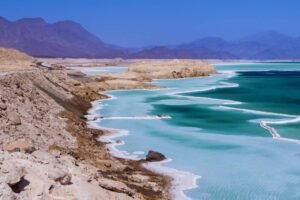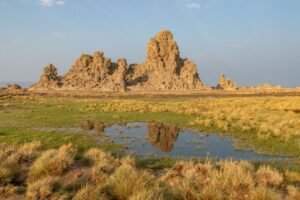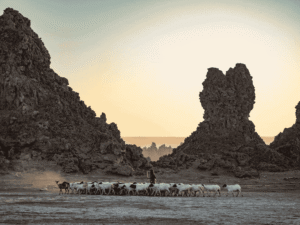


When I first landed in Djibouti City, dust shimmering over the Red Sea, I sensed extremes. Here, the desert scorches; the ocean supports life in strange abundance. Volcanoes, salt flats, marine reserves, islands and forest patches—within a small area, the land holds contrasts that both challenge and enchant. Over several days, traversing roads of cracked lava, sailing over coral reefs, hiking in rare forests, I discovered that Djibouti is a land of geological wonder, marine diversity, cultural resilience—and that every place I visited had stories to tell, not just for sightseeing, but for science, ecology, history. Truly, these are the best places to visit in Djibouti.
Here are some of the best places to visit in Djibouti—what you’ll see, what you’ll learn, and why they matter.
1. Lake Assal — Africa’s Lowest Point & Salt Pan Majesty
I left Djibouti City with the horizon shimmering, wind blowing across white salt crusts. As I approached Lake Assal, the air tasted salty, and the ground cracked in dazzling white against volcanic brown. The lake, lying 155 meters below sea level, is the lowest land point in Africa. Lake Assal – Wikipedia Wikipedia
It’s not just the altitude; it’s the intensity. The lake has no outlet; evaporation is relentless. The water’s salinity is roughly ten times that of seawater. Lake Assal – Wikipedia Wikipedia The salt flats gleam; the salt is harvested under long traditions and now partly industrial concessions. Lake Assal – Wikipedia Wikipedia
Why to visit & what to study:
-
Geology / Earth Science: Lake Assal lies in the Afar Depression, part of the Great Rift Valley. Studying it gives insight into crustal movements, volcanic history, salt deposition, and rift dynamics.
-
Environmental science & hydrology: How do climate, evaporation, human salt-harvesting, and local weather interact? What about conservation of this fragile hypersaline ecosystem?
-
Cultural & economic history: Salt, once called “white gold,” featured in trade, nomadic livelihoods, and local traditions. How is that changing now?
Tips when visiting (for those seeking the best places to visit in Djibouti):
-
Best in cooler months, especially November to January, when heat is less punishing.
-
Accessible by 4×4; the trip takes 2–3 hours from Djibouti City (conditions dependent).
2. Ghoubbet-el-Kharab (Ghoubbet Cove) — Marine Gorge & Underwater Drama
Not far from Lake Assal lies Ghoubbet al-Kharab, a deep cove separated from the Gulf of Tadjoura by narrow underwater channels and dramatic cliffs. Ghoubbet-el-Kharab – Wikipedia Wikipedia The cliffs rise to ~600 m, and below, currents and depths create a rich underwater world. Ghoubbet-el-Kharab – Wikipedia Wikipedia
Marine life flourishes: coral reefs, fish, occasional sharks in deeper zones. The underwater geography, currents, and proximity to volcanic terrain make this area of interest for marine biology, geology, and oceanography. Ghoubbet-el-Kharab – Wikipedia Wikipedia
What to study / experience:
-
Coral reef resilience under strong currents
-
Tidal and current exchange between ocean and cove
-
Volcanic geology: boundary zones, fissures, seafloor structure
Visitor notes:
-
Best when seas are calm; snorkeling/diving with local guides is possible
-
The contrast between ocean and desert is stark—bring sun protection, water, plan long remote drives
3. Lake Abbe (Lac Abbé) — Limestone Chimneys & Otherworldly Plains
Heading southwest of Djibouti, Lake Abbe is one of the most surreal landscapes I’ve seen: steaming limestone chimneys rising from flat salt plains, bubbling springs, desert silence, flamingoes gathering at dawn. (You can find reference to Lake Abbe in compilations of Djibouti’s natural wonders.) New African Magazine
Reaching it means long 4×4 drives, camping, navigating dunes. But the reward is extraordinary—at sunrise or sunset, the chimneys cast dramatic silhouettes over salt flats.
Why it matters & research angles:
-
Geochemistry: mineral deposition from geothermal springs mixing with saline waters
-
Paleoclimate & archaeology: during wetter epochs, human settlements in the Gobaad basin (e.g. Asa Koma) show adaptation to changing climates
-
Ecology: species like flamingos, ibis, jackals, and nomadic livestock eke out life; night skies, minimal light pollution deepen the sense of remoteness
4. Ardoukôba Volcano — Rift’s Fiery Scar
Between Lake Assal and Ghoubbet lies the Ardoukôba volcano, a vivid reminder of Djibouti’s tectonic energy. It last erupted in November 1978 after ~3,000 years of dormancy. (Mentioned in reviews of Djibouti’s wonders) New African Magazine
Though modest in height (~298 m), its fissures, lava flows, and position straddling rift zones make it a compelling study site. Observing basalt flows, fissure propagation, and rift motion gives insight into active plate boundary processes.
Why it’s among the best places to visit in Djibouti:
-
Active geology: rift mechanics, magma paths, earth fissures
-
Volcanology: lava chemistry, heat flow, mapping dormant zones
-
Trekking across lava flows, viewing vistas of Ghoubbet and Assal
5. Day Forest National Park (Forêt du Day) — A Forest Island in a Desert Sea
Most of Djibouti is arid, but high in the Goda Mountains lies Day Forest National Park, one of the few forested refuges in the country. Day Forest National Park – Wikipedia Wikipedia It lies in the Tadjourah region and hosts juniper, wild olive, dragon trees, and endemic birds like the Djibouti spurfowl. Day Forest National Park – Wikipedia Wikipedia
Walking under its canopy, the air cools, moisture increases. Streams may appear, vegetation thickens—life feels different here. It’s fragile, threatened by deforestation, grazing, climate shifts.
Learning & research value:
-
Forest ecology at arid margins: microclimate, moisture retention, species survival
-
Biodiversity: endemic birds, insects, plant adaptation
-
Cultural geography: how Afar and Issa communities interact with, protect, or pressure the forest
Tips:
-
Access via roads from Tadjoura or Randa; trails exist but can be rugged
-
Best in cooler seasons with more moisture
Day Forest is on Djibouti’s UNESCO Tentative List, recognized for its natural significance. Archiqoo+1
6. Moucha & Maskali Islands — Coral Reefs, Beaches & Marine Reserves
Off the coast, in the Gulf of Tadjoura, lie the coral islands of Moucha and Maskali. Clear waters, reefs, vibrant sea life, snorkeling, calm beaches—all within protected zones. These islands are part of Djibouti’s tentative UNESCO natural listings. Wikipedia+1
You’ll find:
-
Marine biology: coral species, reef fish, reef health in face of climate stress
-
Coastal science: water quality, tourism’s impact, conservation enforcement
-
Relaxation & local life: small-scale lodging, interaction with fishermen, observing currents and tides
Practical Tips & Reflections for Deep Travel
As I traveled in Djibouti, here are observations & practical guidance for someone wanting more than mere sightseeing.
-
Best times to visit: Cooler months—November through February—are far more comfortable. The heat outside these months can be extreme in saltpans and desert areas.
-
Travel & Accessibility: Many of the best places to visit in Djibouti demand 4×4 vehicles, experienced guides, and preparation. Tracks are remote and rough.
-
Permits & Protection: Some sites (marine reserves, forest parks) require permissions; specimen collection is prohibited. Respect local regulations and ecosystems.
-
Cultural sensitivity: Djibouti is home to Afar, Issa, Somali, and other communities. Nomadic life, Islamic customs, local hospitality—all are woven into the land. Ask permission before photographing, use local guides, listen to stories.
Final Thoughts: What Djibouti Taught Me
Sitting under a sky lit by both stars and salt dust at Lake Abbe, I realized how Djibouti forces you to reckon with extremes—heat and cold, dryness and depth, silence and streaked skies. But it also surprises you—with green high places, coral reefs glowing beneath shimmering surfaces, birds calling in forest pockets.
Contrast is the thread: white salt rinds against black basalt, deep blue sea in Ghoubbet against ochre lava, forest’s sudden cool breath in the Goda Mountains. Nomads, camels, fishermen—people living at ecological edges.
If you go, go to feel, not just see. Walk salt crust slowly, taste that harsh salt. Sleep under remote stars. Sit with Afar elders, hear salt-trade stories, desert storms, adaptation. Let the quiet of places like Lake Abbe teach you scale, resilience, what survives when most is stripped away.
Because the best places to visit in Djibouti aren’t just scenic—they are lessons in earth, endurance, life at extremes.



One Response